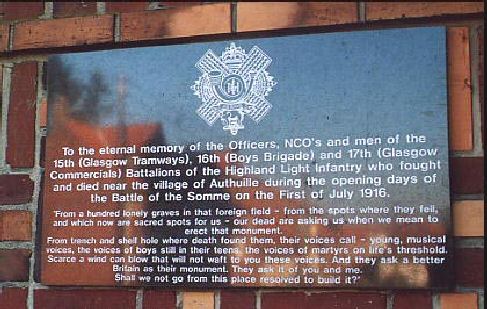
To the eternal memory of the officers, NCO's and men of the 15th (Glasgow Tramways), 16th (Boys Brigade) and 17th (Glasgow Commercials) Battalions of the Highland Light Infantry who foughtand died near the village of Authuille during the opening days of the Battle of the Somme on the First of July 1916
"From a hundred lonely graves in that foreign field - from the spots where they fell,
and which now are sacred spots for us - our dead men are asking us when we mean to erect that monument
From trench and shell hole where death found them, their voices call - young,musical
voices, the voices of boys still in their teens, the voices of martyrs on life's threshold.
Scarce a wind can blow that will not waft to these voices. And they ask a better Britain as their monument. They ask it of you and me.
Shall we not go from this place resolved to build it?".
What were the short and long term effects on Scotland of the war?
The Chinese Communist leader Zhou Enlai visited the United States in 1971. He was asked about the effects of the French Revolution which took place in 1789. He replied, “It is too soon to say.”
The same answer might be given to a question about the effects of WW1 on Scotland!
There were short term effects of course:
• the deaths of Scots in combat. There is disagreement among historians about the final count but it was certainly higher than the original tally of 74 000 and probably higher than 100 000.
• the physical wounds which resulted in a huge demand for artificial limbs and the setting up of hospitals where disabled ex servicemen might live and be cared for. The Scottish War Blinded centre at Linburn for example. Hyperlink
• the psychological wounds. There is a local connection here also. Craiglockhart Hotel in Edinburgh was used as a war hospital and specialised in treating soldiers who suffered from “shell shock”. Hyperlink
These were short term effects but remember that the last “Tommy” who fought in and survived WW1, died as recently as 2009. And of course there are the families and the widows and the orphans. The “short term” effects had a longer term impact also. Another example of this would be the campaign to pardon British soldiers who were executed by the British Army for cowardice.
In 2006, the British government did indeed pardon the men who were “shot at dawn”.
What about the longer term effects?
The war accelerated the process of emigration from Scotland. This process continued at a lower level for most of the 20th century.
In politics, the Liberal Party was replaced by the Conservatives as the dominant force in elections to the UK parliament. The Labour Party grew too and came to control many local councils, especially in the central belt. In the 1960’s and 1970s, the Labour Party started to overhaul the Conservatives in UK elections.
The Scottish National Party can trace its roots directly to WW1 and the Scottish renaissance which followed it. The National Party of Scotland was set up in 1928. The SNP struggled to gain support because the war had been won by a British Army and the British Empire. It was only in the 1970s with the discovery of oil in the North Sea and the final decline of Scottish heavy industry that the SNP gained significant success in UK elections.
Broxburn Academy pupils who have been on the school’s visits to the WW1 battlefields know that there is permanent perspective on WW1 which takes place every night without fail at the Menin Gate in Ypres …